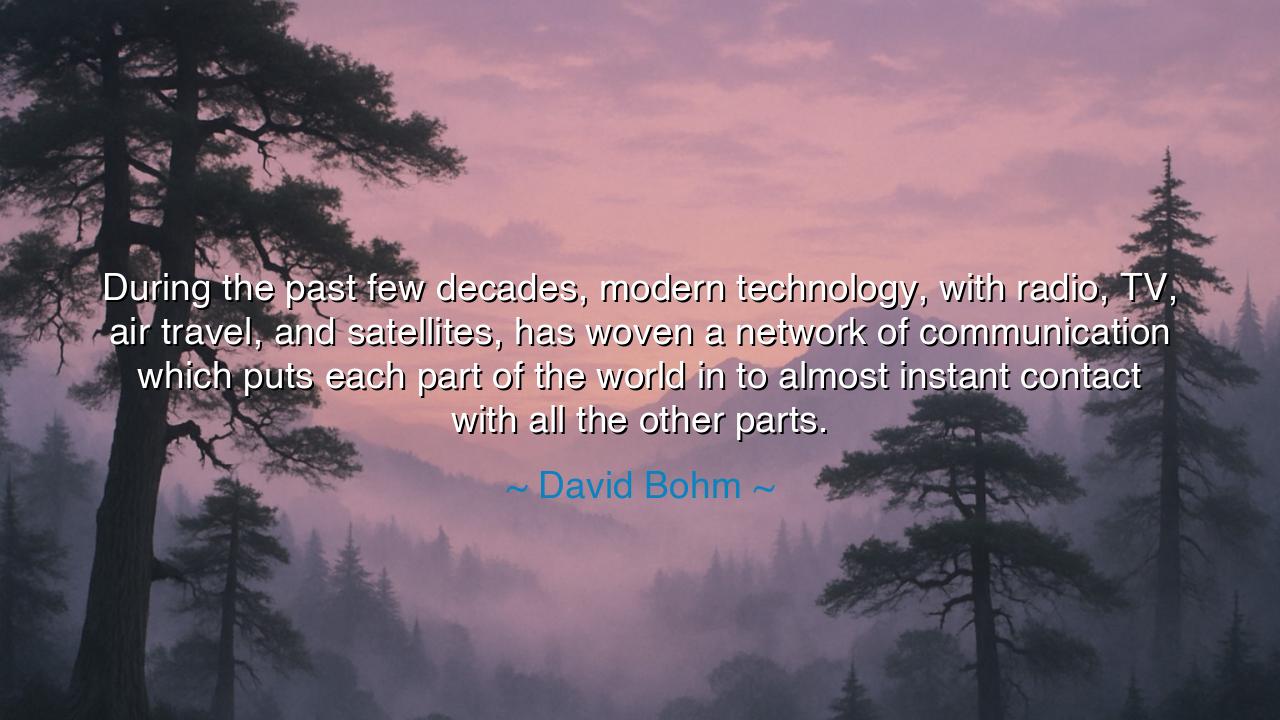
During the past few decades, modern technology, with radio, TV
During the past few decades, modern technology, with radio, TV, air travel, and satellites, has woven a network of communication which puts each part of the world in to almost instant contact with all the other parts.






Hear, O seeker of wisdom, the words of David Bohm, physicist and philosopher of hidden orders: “During the past few decades, modern technology, with radio, TV, air travel, and satellites, has woven a network of communication which puts each part of the world into almost instant contact with all the other parts.” In these words we hear the awe of a man who understood not only the workings of particles and waves, but also the transformations of society. He reminds us that humanity, once scattered and slow in its exchanges, has bound itself together into a single living web, where distance has lost much of its power.
The essence of this saying is the creation of a global network. For countless millennia, communication was bound to the speed of footsteps, of horses, of ships upon the seas. A message might take months to cross an ocean, or years to span empires. But in Bohm’s age, and even more in our own, this ancient limit was shattered. With radio, voices flew invisibly across continents; with television, images and stories united millions at once; with air travel, bodies followed where voices had already gone; and with satellites, the very heavens became messengers. Thus, the world became not a scattering of tribes, but a single organism, pulsing with near-instant exchange.
History shows us how revolutionary this shift has been. When Neil Armstrong set foot on the moon in 1969, his words—“That’s one small step for man, one giant leap for mankind”—were heard almost instantly by millions across the Earth. This moment would have been unthinkable in earlier ages. A triumph occurring thousands of miles away, in the cold silence of space, was shared in living simultaneity by farmers, kings, and children alike. It was not only Armstrong who stepped upon the lunar soil—it was the entire world that felt the weight of his foot. Bohm’s words reflect this new reality: the weaving of humanity into one fabric of perception.
Yet this weaving is not only triumph, but also burden. For to be in instant contact means that sorrow travels as swiftly as joy. Wars, disasters, and suffering are no longer distant shadows but immediate presences in our minds. A famine in one land, a flood in another, a conflict across seas—all reach us in moments. Bohm’s insight, then, is both celebration and caution: to be bound in such a net is to share not only light but also shadow, not only progress but also pain. The gift of communication demands the maturity to bear what it reveals.
The ancients foresaw such unity in myth and prophecy. The Stoics spoke of the cosmopolis, the city of the universe, where all are citizens of one great whole. The prophets dreamed of a day when nations would “beat their swords into plowshares” and speak with one voice of peace. Bohm points to the tools that make such visions possible, yet also warns us by implication that tools alone do not bring wisdom. We may be united in technology, yet divided in spirit, unless we choose harmony over discord.
Consider the life of Mahatma Gandhi, who, though living in an age before satellites and global internet, understood the power of communication. His words, carried by newspapers and radio, inspired millions across continents to rise in nonviolent resistance. If his message could ripple outward with such force in limited times, how much greater, Bohm suggests, is our power now, when every voice may cross the world in moments? The question becomes not “Can we speak?” but “What shall we say?”
The lesson, then, is this: use the network of the world wisely. Speak not only to be heard, but to uplift. Share not only noise, but meaning. Travel not only to consume, but to connect. For we dwell in a time when every word, every image, every action can echo across the globe in an instant. If we fill this net with discord, it will entangle us; but if we weave it with truth and compassion, it will lift all humanity into a higher order of being.
Thus Bohm’s words stand as a torch for the present and the future: the Earth is now a single web, fragile yet strong, uniting all corners into one. Let us honor this gift by ensuring that the network of communication we have built is not only a triumph of technology, but also a triumph of the human heart.






AAdministratorAdministrator
Welcome, honored guests. Please leave a comment, we will respond soon